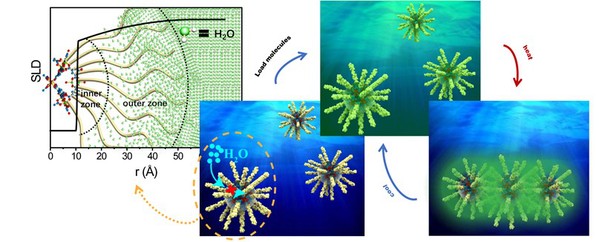Yuyan Lai, Mu Li, Mingxin Zhang, Xinpei Li, Jun Yuan, Weiyu Wang, Qianjie Zhou, Mingjun Huang, and Panchao Yin*
Materials under space confinement can alter their physical and chemical properties, paving the way for new science and novel applications. Nanoparticles can enforce spatial constraints on the polymers densely grafted on their surfaces, which can effectively change polymers’ thermal/mechanical properties and finally lead to significant mechanical reinforcement for the obtained nanocomposites. Here, we describe the confinement effect that metal−organic polyhedron (MOPs), nanoparticles with monodispersed and ultrasmall sizes (∼2 nm), impose to the 24 poly(N-isopropylacrylamide) (PNiPAM) chains grafted on their surface. The curved surface of the MOP brings unique confinement to the grafted PNiPAMs: the inner fraction of PNiPAM chains is under ultraconfinement, while the outer fraction is almost free. Suggested from small angle neutron scattering studies, the outer layer polymers stay hydrated and help solvate the nanocomposites in water, while the inner polymer layer prohibits the water penetration into MOP area and contributes to the high stability of the MOPs. Such a confinement effect further influences the thermoresponsiveness of PNiPAM−MOPs in solutions and enhances their efficiency for controlled separation and release of small molecules.
空间限制可以改变材料的物理和化学性质,利用这一点我们可以挖掘已经成熟发展的材料的新的科学价值和应用价值。在纳米颗粒表面上密集接枝的聚合物受到很强的空间约束作用,这可以有效地改变聚合物的热/机械性能,并最终为获得的纳米复合材料带来显着的机械增强作用。在这里,我们描述了在金属有机多面体(MOP,单分散且超小尺寸(〜2 nm)的纳米颗粒)密集表面接枝的24条聚(N-异丙基丙烯酰胺)(PNiPAM)链上的空间限制作用。 MOP的球形表面为接枝的PNiPAM带来了独特的局限性:PNiPAM链的内部部分处于超约束状态,而外部部分几乎没有约束。从小角度中子散射研究表明,外层聚合物保持水合,使纳米复合物可以分散在水溶液中,而内层聚合物则阻止水渗入MOP区域,提高MOP的在水中的稳定性。此外,这种限制作用进一步影响了溶液中PNiPAM-MOP的热响应性,并提高了其控制小分子分离和释放的效率。

文章链接:https://dx.doi.org/10.1021/acs.macromol.0c00295

